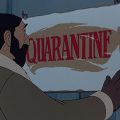Quarantine Control #20: Whoops, We Made It

This is the 20th installment of Damage Control’s Quarantine Control series, but what’s most remarkable is how little has changed since the first post regarding the COVID-19 pandemic — especially in the United States. Sure, there was a brief time when a bunch of state governments and the federal government took the pandemic at least somewhat seriously, but that’s long passed. The only thing new that’s happened is how some schools actually thought they could open and created miniature spreading events. And now those students, college students among them, are being sent home so they can potentially infect their family members. Cool stuff.
Basically: Yes, stay home as much as you can and occupy your free time there. One of your activities could involve reading this very post.
Geoffrey Barnes
Logan (2017)
Source: Blu-ray
It’s a movie

I had an idea of what to expect from Logan before sitting down to watch it, and not solely because of the positive critical reception it garnered. The Wolverine movies established a pattern of improving as the series progressed, starting with the stultifying mediocre X-Men Origins: Wolverine followed by the very good The Wolverine. But I also had a good feeling about Logan because this was a swan song of sorts from the X-Men movie series as we knew it. This marks the last time Hugh Jackman played Wolverine, along with the final appearance of Patrick Stewart as Professor Charles Xavier. This was going to go out with a bang, and oh man did it.
Logan benefitted from the success of Deadpool in being a profitable R-Rated superhero film, which allowed them to tell the mature and edgy (pun extremely intended) tale of an older and broken Wolverine later in his life. It’s somewhat of an adaptation of the Old Man Logan comics, but with a number of changes to create a tale that fit within a film that’s slightly longer than two hours. Logan here is even more cynical than he was in previous films, a role Jackman fits like a glove at this point after having played the character for 17 years. Despite the maturation in storytelling thanks to the rating, it never feels out of place compared to the previous X-Men films.
There are superpowers involved, yes, but I’m hesitant to label Logan as a superhero film. It’s more of a survival action movie as its three central characters, Logan, Professor X, and Laura (aka X-23) travel around the south, Midwest, and western parts of the United States to escape federal agents who’ve successfully rid the country of mutants (though they aren’t solely responsible for their disappearance). I laughed at the ostensible comparisons to The Last of Us (especially with Hugh Jackman being considered to play Joel in a potential film at one point), but the movie itself doesn’t actually feel like that game.
What I liked most about Logan is how it showed that superhero movies are capable of more than the comparatively generic (though still fun, don’t get me wrong) action and stories expected from movies in the Marvel Cinematic Universe and others, just as Deadpool did before it. It’s a shame this and Deadpool 2 could mark the end of a too-short era in an unintended way, because Disney isn’t likely to green light any R-rated superhero tales in the near future, if ever. We’ll see if the sacrifice was worth it for these characters joining the MCU.
Logan couldn’t have been a more fitting end for the X-Men movie franchise as we knew it. It’s a good thing they didn’t make another movie last year, nor do they have a spinoff being sent to die in theaters next week, right? Exactly.
Prince of Persia: The Sands of Time (2010)
Source: Disney+
It’s a movie

I’m not sure how I dodged the Prince of Persia film until now, yet I did. It was made at a more halcyon time when the franchise was still important for Ubisoft to keep around for more than mobile games and VR experiences, and before a potential new project was cancelled. The movie is called “The Sands of Time,” though its story isn’t a direct adaptation of the similarly-named game outside the existence of a Prince and the Dagger of Time. Most of the changes were necessary for a plot that fit within the confines of a two-hour movie, though SoT game wasn’t long. But Farah and the Vizier are nowhere to be found, with original characters who play somewhat similar roles taking their place.
The overall movie is what I would have expected from the same team that made the Pirates of the Caribbean films for Disney. It’s not a great movie thanks to the largely unoriginal story and storytelling devices, and I don’t have the space or energy to wade through all the assumptive leaps and contrived sequences it has. But it’s a perfectly good shut-your-brain-off fun popcorn film that reminded me of the first actually-good PotC film, and this PoP movie didn’t need to be anything more than that. This alone makes it better than the average video game adaptation.
A pity there was a shortage of Iranian and Middle Eastern actors they could have cast in this film (Note: This is sarcasm), and the filmmakers had to settle for brown-facing Caucasian actors like Jake Gyllenhaal and Gemma Arterton — especially the latter. (Before you get annoyingly pedantic: I’m aware Iranians can be light-skinned.) But it is a beautiful-looking film, expected from the PotC team.
The PoP movie is a largely forgettable affair, but I don’t regret watching it and it has enough blockbuster thrills to be entertaining. It was only shortly after I watched this that rumors surfaced about some sort of PoP remake coming. If it happens, don’t forget that my unique powers helped will this into existence.
Angela Moseley
Ergo Proxy (2006)
Source: Hulu
Episodes: 23

Ergo Proxy was an anime I constantly saw Geneon advertise in the mid-aughts, but I never sat down to watch the show. I didn’t know what to make of it at a glance. Was it sci-fi? Cyberpunk? Or something else? Recently, a mutual on Twitter mentioned how much he loved the show and justified it in a short thread. Was this show as good as he hyped it up to be? Was the show’s reputation for being confusing and pretentious correct? It seemed to be worth trying out for myself.
In an unknown future humanity has collapsed due to an ecological catastrophe. The survivors live in a domed city known as Romdeau with androids (called AutoReivs) to serve their every need. Everyone has a purpose, obedience to the system is a must, and this utopia is actually a dystopia. AutoReivs have been going rogue and murdering humans as they become infected by the Cogito virus. This infection causes them to go insane after becoming self-aware aka acquiring a soul. Re-l Mayer is an investigator for the Intelligence Bureau tasked with looking into the murders with her AutoReiv, Iggy. She’s attacked by a powerful monster-like creature at home which she later learns is called a proxy. However, she’s forbidden from uttering the word and the Security Bureau strives to keep this information hidden from her. Meanwhile, Vincent Law is a recent immigrant to Romdeau. Re-l finds his necklace in her apartment on the night she was attacked. She suspects Vincent of being connected to the mystery of the proxy.
Ergo Proxy certainly feels like it was made in 2006. Despite all of its philosophical underpinnings, this is a story about a journey to find oneself. In that regard the show is similar to Wolf’s Rain and Samurai Champloo. Unlike those shows, the destination turns out to be fairly important. As a lot of questions about the state of the world are raised during the journey. Fortunately, just about every question presented in Ergo Proxy has a mostly satisfying answer. We undergo a major shift in perspective as it is revealed Vincent is the true main character, not Re-l. Nearly everything we learn is seen through his eyes, save for some reveals near the end of series. Even with reveals, the show is not above screwing with the minds of viewers. A lot of times I found myself confused. Did certain events actually happen in an episode or did they just occur inside of a character’s mind? The answer is certainly is a mix of both, though some episodes are more obvious than others.
Ergo Proxy is also a slow burn. It has psychological elements in addition to the philosophy, but calling it a thriller would be a stretch. There wasn’t much action to balance out the focus on the philosophical. I found the first few episodes within Romdeau both fascinating and difficult to sit through. The show leaned heavily on Latin and Greek themes to make its point about how citizens were little more than thoughtless cogs in a machine. Fortunately, things picked up when the show focused on Vincent and his AutoRiev companion, Pino rather than Re-l. It became clear the citizens were lied to about Romdeau being the final strong hold of humans, as some of them do exist outside of the dome. Things became even more exciting when Vincent explored the ruined world and found people (or a lack of) in other domes. Some places were constantly at war and on the brink of collapse. Other places were completely free of humans. There was even a Disneyworld parody dome where people were thriving to a degree. Ultimately, the journey was all about how people and proxies made the best of the dystopia. Once the plot came full circle, themes of abandonment of responsibility, going insane without a reason for living, free thought, and breaking free from the shackles of expectation came into play.

Mind screws aside, I found Ergo Proxy to be a refreshing thought exercise in literary themes. I did chuckle at how a few allusions to Greek mythology were on the nose. Some of the more humorous episodes (looking at you “Who Wants to Be in Jeopardy” and “Eternal Smile”) and elements kept the series from being too dark and edgy.
If you enjoyed shows like Serial Experiments Lain, Ghost in the Shell, or Wolf’s Rain for the philosophy, you’ve probably already seen Ergo Proxy. If not, give it a try. Be warned, the real plot doesn’t get rolling until about episode four.
Joseph Daniels
A few weeks ago, I briefly mentioned I was trying out a podcast I wasn’t entirely happy with. I listened to a few more episodes since then and I think I’m going to mention it here but not recommend it. Hello From The Magic Tavern is a fantasy-based podcast where the host, Arnie Niekamp, accidentally fell through a portal into the world of Foon. This magical world is largely based around a sense of humour that I’m not too interested in. I might still listen to the show from time to time but the humour far too quickly goes to places that I don’t enjoy. I’d say it’s like if Piers Anthony’s Xanth series or Terry Pratchett’s Discworld series always dove into the raunchiest subjects possible and when not talking about non-standard applications of sex (Chunt is a shapeshifter who will turn into the last creature he has sex with), babies dying comes a close second. The only reason I’m continuing to listen to the podcast is because of the strength of episode ten, which instead of being about Foon and the residents therein, Arnie was a bit homesick and ended the podcast early. The rest of the episode was an accidental broadcast of an extra-dimensional conversation which makes it seem like a lot more is going on with the podcast than merely being a fantasy-based show in the magical land of Foon. I’m fourteen episodes into a series with over two hundred of them and I’m probably never going to catch up to the present day but I don’t really want to. This is only a sometimes podcast, one that I’ll listen to an episode when I’m bored and when I’ve forgotten what it is I don’t like about it.
Instead, this week I discovered a much better podcast, one in which I’ve also only listened to a few episodes, but it’s much more to my liking.
Omnibus (2017)
Source: Spotify (and/or your favourite podcast service)
Episodes: Ongoing (currently 286)

Omnibus is the brainchild of Ken Jennings and John Roderick. The premise is that the podcast is going to be preserved somehow so that in the far future, after a catastrophe wipes us off the planet, whoever unearths the podcast will be able to listen to a time capsule of interesting pieces of human history. There are presumably at least 1458 entries in the Omnibus according to the way the episodes are titled. The first episode is about The European Starling and the time when a bunch of them got released in Central Park, and is numbered 431.PS8403. If each entry in the Omnibus so far were arranged in alphabetical order, the number to the left of the decimal point would be in numerical order, although there were three entries added within about two and a half months that were given the number 1411, so there’s an internal logic that I’m not yet privy to regarding both the number to the left and the number to the right of the decimal point. I have only listened to five episodes, so for all I know, the series goes downhill from there. Likely it doesn’t, but this is something I’ve been doing with podcasts that have been around for a long time. I’ve been recommending them based on the strength of their early episodes and taking a chance that later episodes are up to the same standards.
This podcast is supposed to explore stuff that people might not know about, or is fascinating in general. Of the first five episodes, I’ve known about the Pig War, I’d heard about the Defenestrations, but while I’d known about Smell-O-Vision, it was great to actually listen to what it was all about rather than just know it existed at some point and that’s it, like a Jeopardy fact that you know for $1000 but don’t understand beyond that. Future episodes that I’m looking forward to listening to will talk about Thomas the Tank Engine (something I grew up with), Heil Honey I’m Home (something I didn’t grow up with but which I’d heard about on many lists of top ten worst television shows or comedies or shows which got cancelled after one episode… basically, top ten lists made so the writer could talk about a failed sitcom about Hitler), Milli Vanilli (I feel like they’re still notorious even to this day), the Anarchist Cookbook (although I hadn’t downloaded it in particular when I was new to the Internet, I am familiar with it and with another early piece of Internet media which I did download, the Jargon File) and furries (no joke, furries like me are the subject of episode 166, entry number 508.GN2716 in the Omnibus).
Apparently furries are worth preserving.
Omnibus started in December 2017. I remember back to those halcyon days, we all feared that civilization wouldn’t last for much longer, but it didn’t seem 100% likely that something actually would happen. By then, we were almost halfway through the Trump presidency (I love how I’m acting like Trump’s only going to be a one term president despite the various ways in which he’s just recently tried to suppress Democrat votes in the lead-up to November’s election), and the world hadn’t ended yet. Sure, things between North Korea and the United States weren’t great, and the world had just learned the word “dotard,” but human civilization wasn’t really about to end… was it?
Just in case it was, the Omnibus project was started by Ken Jennings and John Roderick. John is a musician and currently produces four podcasts including Omnibus, and Ken has written a dozen books as well as narrated at least two audio books (oddly enough, those two audio books came after Omnibus started). Together, Ken and John have some decent chemistry, and the subject matter isn’t dry either. It’s great for listening to while grinding for money and/or levels in a Dragon Quest game and makes for a decent break in between episodes of other podcasts I’ve recommended here, like No One Can Know About This and Canadaland.
One wonders what the hosts think about the Covid-19 epidemic.
High Score (2020)
Source: Netflix
Episodes: 6

High Score is a six-episode documentary series about the early days of video games. Stopping just short of the time period which gamers largely consider the end of the “classic” era, that is, when the N64 and PlayStation made 3-D graphics and gameplay possible, the series focuses on the people who worked on the games as well as the people who played them. Given that this is a Netflix series and is aimed towards a casual audience who might not be as familiar with gaming, it can be forgiven that there are omissions in the series. Certainly, hardcore audiences will wonder why this game or that game wasn’t included.
The thing is, this isn’t supposed to be an in depth discussion. Much like my Retrospectives that I’ve been posting, I’m not trying to cover every single aspect of the games I’m featuring, although I am trying to be somewhat thorough. High Score isn’t going to cover every single game either, and is more for general knowledge than in depth trivia. The JRPG genre, for example, could easily be a six part series on its own, possibly more, and given the origins of the genre, it’s possible that such a series wouldn’t even begin discussing JRPGs until episode two. The origins of Dragon Quest would be its own episode. The origins of Final Fantasy would be its own episode. The first four Phantasy Star games would be its own episode. Then episode five would probably focus on other games in the NES era. And episode six would bring Final Fantasy and Dragon Quest into the SNES era and also discuss Breath of Fire and Lufia a little bit and maybe end with Chrono Trigger. Even then, it would leave a lot of JRPGs on the cutting room floor. So you can see what kind of challenge was being faced by the makers of High Score. It’s impossible for a six episode series to be as complete as gamers would probably like it to be.
As it is, Japanese RPG Dragon Quest and American RPG Wizardry were noticeably absent from the episode devoted to role-playing games, but given the sheer amount of ground a forty minute episode would have to cover, it’s not surprising. The episode had to cover both the American and Japanese sides of the genre as well as the ways in which the evolving technology of the time allowed the genre to evolve. The episode also wanted to focus on the human interest story of the first LGBTQ video game GayBlade, which thanks to a moving company that really didn’t give a shit (I know all about those), the original master copies of the game were lost as well as the source code and any back-ups that were made. The original developer and programmer of the game, Ryan Best, has been stuck searching for copies of the game he made ever since, going to garage sales and trying to contact anyone on-line who might be able to help.
Fortunately, in 2019, literally during the filming and production of High Score, a copy of the game’s files were found in Europe, bringing this human interest tale to a happy conclusion and rescuing an important game in the history of both the LGBTQ community and the RPG genre back from digital oblivion.
High Score is great as an entry level introduction into the history of video games and has just enough of a mix of general knowledge and perhaps lesser known aspects of gaming that if anyone’s really interested in learning more, they can seek out various, admittedly lower quality but much more in depth videos on Youtube discussing the history of various genres.
It’s tough to think of anything more to say here outside of telling you all to stay safe and heed the advice of experts who actually know what they’re talking about over the people who say masks are for sissies. We’ve been in quarantine for too long (assuming you’re not one of the people saying quarantines are for pussies too, goodness), longer than we should have been, but it’s not like we have any other choice at the moment.





